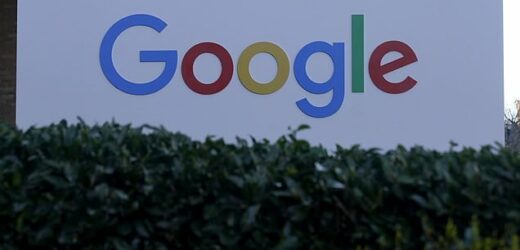Google is ordered to sell off parts of its lucrative digital ad business that is worth a total $224.5 billion as Europe’s anti-trust watchdog says it is the only way to address anti-competitive practices
- The EU ruled that Google has abused its dominance in advertising services
- It said a divestment of Google’s ad business was the only way to remedy this
European Union antitrust regulators took aim at Google’s lucrative digital advertising business in an unprecedented decision on Wednesday, ruling that the tech giant must sell off some of its ad business to address competition concerns.
The 27-nation EU has led the global movement to crack down on Big Tech companies – including groundbreaking rules on artificial intelligence – but it has previously relied on issuing blockbuster fines, including three antitrust penalties for Google worth billions of dollars.
It’s the first time the bloc has told a tech giant that it must split up key parts of its business over violations of the EU’s strict antitrust laws, though details on what that would look like have not been released.
Google can now defend itself by making its case before the commission issues its final decision.
The company said it disagreed with the finding and ‘will respond accordingly,’ with the EU’s investigation focusing on a narrow part of its ad business.
A Google sign is shown at the company’s office in San Francisco, on April 12, 2023. European Union antitrust regulators on Wednesday, June 14, 2023, took aim at Google’s lucrative digital advertising business, ordering the tech giant to sell off some of its ad services to address competition concerns
The commission’s decision stems from a formal investigation that it opened in June 2021, looking into whether Google violated the bloc’s competition rules by favoring its own online display advertising technology services at the expense of rival publishers, advertisers and advertising technology services.
‘The Commission takes issue with Google favoring its own online display advertising technology services to the detriment of competing providers of advertising technology services, advertisers and online publishers,’ the EU competition enforcer said in a statement.
It said Google has since 2014 abused its dominance by favoring its own ad exchange AdX in the ad selection auction by its dominant publisher ad server DFP and also by favoring its ad exchange AdX in the way its ad buying tools Google Ads and DV360 place bids on ad exchanges.
The EU competition watchdog said a behavioral remedy is unlikely to be effective to stop the anti-competitive practices.
‘The Commission’s preliminary view is therefore that only the mandatory divestment by Google of part of its services would address its competition concerns,’ it said.
Google vice president of global ads Dan Taylor said: ‘Our advertising technology tools help websites and apps fund their content, and enable businesses of all sizes to effectively reach new customers.
‘Google remains committed to creating value for our publisher and advertiser partners in this highly competitive sector.’
European Commission Vice President Margrethe Vestager
But European Commission Vice President Margrethe Vestager says Google is dominant on both sides of the ad-selling market. Google abused that position by favoring its own ad exchange, reinforcing its ability to charge a high fee for its services, the commission said.
‘Google is representing the interests of both buyers and sellers. And at the same time, Google is setting the rules on how demand and supply should meet,’ she said at a news conference.’ This gives rise to inherent and pervasive conflicts of interest.’
YouTube was one focus of the commission’s investigation, which looked into whether Google was using the video sharing site’s dominant position to favor its own ad-buying services by imposing restrictions on rivals.
Google’s ad tech business is also under investigation by Britain’s antitrust watchdog and faces litigation in the U.S.
Brussels has previously hit Google with more than $8.6 billion worth of fines in three separate antitrust cases, involving its Android mobile operating system and shopping and search advertising services.
The company is appealing all three penalties. An EU court last year slightly reduced the Android penalty to 4.125 million euros. EU regulators have the power to impose penalties worth up to 10% of a company’s annual revenue.
Source: Read Full Article




